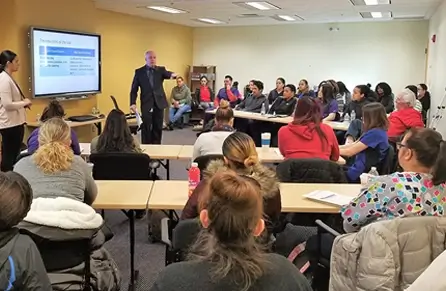Why Networking is Crucial in Vocational Training
Networking is a pivotal component of vocational training, especially for those seeking career advancement in healthcare, technology, and skilled trades. At the LARE Institute, networking is not just an add-on; it’s an integral part of the educational experience. For young adults and mid-career changers in Andover, Massachusetts, building connections can significantly enhance opportunities for job placements and career growth.
Networking provides access to industry insights, mentors, and potential job openings that are not always advertised. It bridges the gap between education and employment, allowing students to gain first-hand knowledge from industry professionals. This supportive environment fosters confidence and encourages students to actively pursue their career goals.
Tips for Effective Networking in Healthcare, Tech, and Trades
Engage in Industry-Specific Events
Participating in industry-specific events is a great way to meet professionals and learn about the latest trends and technologies. Whether you are pursuing a program in healthcare, technology, or skilled trades, attending conferences, workshops, and seminars can open doors to new opportunities.
Utilize Social Media Platforms
Platforms like LinkedIn are invaluable for expanding your professional network. By connecting with classmates, instructors, and industry professionals, you can build a robust online presence that showcases your skills and achievements.
Join Study Groups and Clubs
Study groups and clubs at LARE Institute offer a community-focused setting to interact with like-minded peers. These groups provide a platform for sharing knowledge, discussing career paths, and forming lifelong professional relationships.
Leveraging LARE’s Community: Events and Opportunities
LARE Institute hosts various networking events designed to connect students with industry leaders. These events are empowering and foster a sense of belonging, making students feel like they are part of a family. From career fairs to guest speaker sessions, there are numerous opportunities to engage with professionals who can guide and mentor you.
Additionally, the institute’s success stories highlight how past students have leveraged these opportunities to achieve remarkable career milestones.
Building Long-Term Professional Relationships for Career Growth
Building long-term relationships is essential for sustained career growth. By maintaining contact with instructors, alumni, and peers, you create a network of support that can provide guidance and open doors throughout your career. These relationships are built on trust and mutual respect, aligning well with LARE Institute’s values of community and support.
Investing time in nurturing these connections can lead to collaborations, referrals, and continuous learning opportunities, further enhancing your professional journey.
Success Narratives: Students Who Advanced Through Networking
At LARE Institute, numerous students have transformed their careers through strategic networking. For instance, a recent graduate from the healthcare program was able to secure a position at a leading hospital by networking with alumni and participating in institute-sponsored events.
Another success story from the technology program highlights a student who started as an intern and, through professional connections made during their studies, advanced to a managerial position in a reputable tech firm. These narratives emphasize the power of networking in shaping successful careers.
Are you ready to take control of your future? Join the LARE Institute community and start building the connections that will empower your career. Contact us today to learn more about our programs and how we can support your journey towards achieving your goals.








